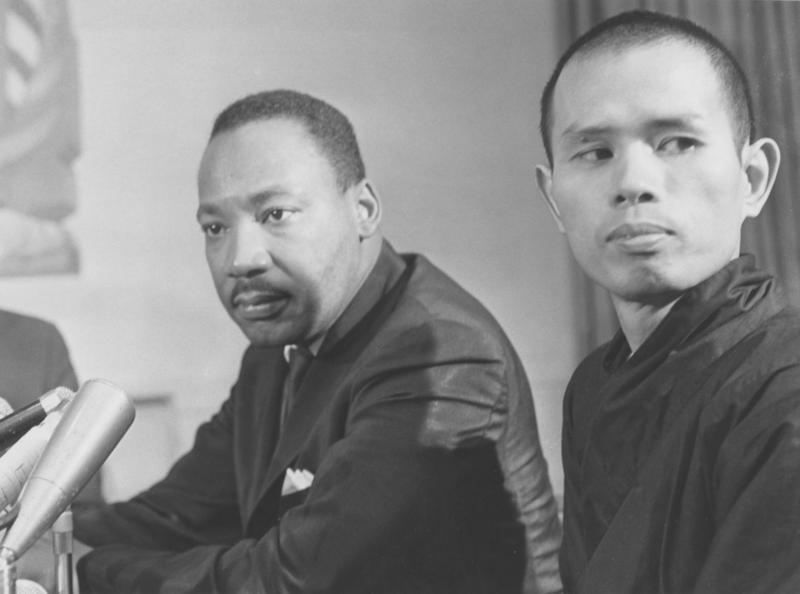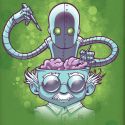|
After much contemplating and meditating on the question of being in a simulation, I've still come up with love as the most beautiful and liberating thing that a human can recognize or aspire to. It is the equilibrium solution. I don't think that Siddhartha taught that reality was an illusion. He did teach that your conscious experience of reality is a representation of reality in itself, but your consciousness is not reality in itself. The illusion there is not realizing your consciousness isn't the same as reality. It's reality mediated by your eyes and brain and other organs. It blossoms from and reflects the reality in itself, also called suchness or thusness.
|
|
|
|

|
| # ? May 15, 2024 00:15 |
|
Nessus posted:To ask you another question, just to make sure I understand YOUR question: Simulation theory is, broadly, the idea that we aren't "really" experiencing what we're experiencing, but that we're like dorfs in Dwarf Fortress just on a far more sophisticated scale; is this correct? Yeah, I guess so. Like reality is God playing The Sims, sorta. Or like how René Descartes concludes he can't tell if we're all in a dream? That idea can seem a little scary, and people often think of this world as a hell. I like how Buddhism offers a way out of this suffering existence. The idea of liberation is very compelling. I'm trying to understand the metaphysics. I'm not some cynical atheist type who wants to strip away anything that sounds far-fetched or supernatural and reduce Buddhist thought to bare-bones psychological principles. On the contrary, I find the cosmic and mythological aspects of all religions quite fascinating. I thought of the idea of a "gamer God" when I was thinking about Christianity and Jesus. I thought of Jesus as God stuffing Himself into a human suit and giving Himself access to some cheat codes so he could interact with humans in a memorable way. Then I thought of the idea that everybody might be God, like He's alone, builds a map (the universe), then populates it with characters. Then He goes into each one and plays through their entire life as an RPG. Rewind time, and do it again with somebody else, repeat indefinitely. Sometimes God might be born a crack baby, or a serial killer; other times He turns on easy mode by being born rich. Sometimes He's a saint. Sometimes He's a goon. Why does He do it? Boredom, I guess. This "gamer God" theory explains suffering and evil as a self-inflicted challenge and roleplaying style. This idea was very similar to Hinduism, where the Brahman is the Universe and everything in it. Souls aren't distinct from Brahman, just pieces of him/it stuffed into bodies which are also made of him/it. Buddhism has this idea of awakening, or an epiphany. It made me think of an NPC in a video game becoming self aware. What if you were a goomba, and you awoke to the realization that your life is the repetition of being stomped on by Mario? You would want to escape that cycle. If reality is just a highly detailed simulation, then perhaps Buddhist thought and practice is the way to exit. I am probably being far too literal.
|
|
|
|
Escape Addict posted:Yeah, I guess so. Like reality is God playing The Sims, sorta. Or like how René Descartes concludes he can't tell if we're all in a dream? That idea can seem a little scary, and people often think of this world as a hell. Here's a short story by Andy Weird entitled "The Egg" that touches on the themes you talk about. http://highexistence.com/images/view/the-egg-by-andy-weir/
|
|
|
Escape Addict posted:Yeah, I guess so. Like reality is God playing The Sims, sorta. Or like how René Descartes concludes he can't tell if we're all in a dream? That idea can seem a little scary, and people often think of this world as a hell. For one thing Buddhism does not hold with a singular creator god. Massively powerful cosmic beings are not incompatible with Buddhism, but the idea of a capital-g God who Created All Things is I believe specifically spoken against. On a personal basis I feel like the simulationist vision of reality is a mixture of two incorrect ideas: one is the idea of a singular Judeo-Christian style god, and the other is that our current models and concepts of reality (things like "computer simulations") are either at or pretty close to the deep explanations of how things really fundamentally are.
|
|
|
|
|
to oversimplify a bit (and this may vary somewhat by tradition): it’s not a matter of you escaping to somewhere else - there is no (fixed or independent) you, no atman or jiva behind the curtain - there is nowhere else, no maya to be transcended, beyond which reality lurks eta: here is some material from the OP that may be helpful Quantumfate posted:But what IS buddhism? Red Dad Redemption fucked around with this message at 01:32 on Jul 31, 2018 |
|
|
|
Escape Addict posted:Yeah, I guess so. Like reality is God playing The Sims, sorta. Or like how René Descartes concludes he can't tell if we're all in a dream? That idea can seem a little scary, and people often think of this world as a hell. This is the basic idea behind, like, 85% of what Alan Watts talks about.
|
|
|
|
Thanks for the replies. That egg story was pretty cool. Reminds me of a Neil Gaiman story about Hell which was similar. I don't personally subscribe to simulation theory any more than I do other religious ideas, which is to say, I shrug my shoulders and say, "Yup, could be." I do think it's kinda neat though, just to imagine. I don't know if God exists. I used to be pretty Christian when I was younger, but I can't wrap my head around the problem of evil. Seems sadistic for a creator to make a world where suffering is so unavoidable. That's why I was cooking up justifications like that "gamer God" theory. These days, I'm gravitating towards Buddhism. Where I grew up, a lot of folks were Buddhist in name only; just going through the motions, or showing up to temples for funerals or Obon season. I think a lot of my family did it just for ritual's sake, not cause they believed in rebirth or karma. But I went to Christian school, so I got a hefty dose of that for a lot of years. As an adult, Buddhism makes the most sense to me. I want to explore it more deeply. I've been reading the online guide to Vipassana. It's tough, but it seems very worth the effort.
|
|
|
|
Nessus posted:For one thing Buddhism does not hold with a singular creator god. Massively powerful cosmic beings are not incompatible with Buddhism, but the idea of a capital-g God who Created All Things is I believe specifically spoken against. It certainly depends on the Buddhist who's answering. Thich Nhat Hanh does not hesitate or stumble talking about God, even as he is passing on the non-theist lessons of Siddhartha Gautama. There are Christians who will say Buddhism is incompatible, and Buddhists who say Christianity is incompatible. Then you have folks like these bros:  I love them both dearly. I meditate on them daily, as often as I meditate on their spiritual great teachers. Neither could be called wishy washy types. They were both religious scholars who understood that whether it's a personified logos or a non-personified dharma, it's possible to misunderstand either one such that the consequences are deadly, genocidal, or now even omnicidal. And that's the condition confronting today's humans. Escape Addict posted:Thanks for the replies. That egg story was pretty cool. Reminds me of a Neil Gaiman story about Hell which was similar. I encourage that deeper examination. Let us know how that goes  As for Christianity, I'd just mention two valuable lessons I still get from it. The first is the unlocking of the prophetic tradition in every person and nation. It is the human tradition of speaking truth, especially when it's unpopular, especially when it indicts the powerful, even when it will get you marginalized or killed or worse. The second and more controversial lesson I keep is an ever-returning certainty of the ultimate and universal victory of compassion and understanding. The evolution of the cosmos is not just messy, it's also been bloody and sad here in this holocene. But it is also possible for a human to envision all this, including our suffering, as a whole-of cosmos effort towards ultimate liberation. And when this certainty recedes, it's also possible to find acceptance in achieving the most free state possible, even as it falls short of ultimate and everlasting liberation. In the Mario analogy, consider a goombah who has been struck by a vision of a higher existence that it can ultimately never reach because the goombah cannot exist outside the console. Nevertheless, this prophetic goombah may still free itself and the other npcs away from an existence of merely walking back and forth and towards an existence where they love and understand as much as they can love and understand. As an npc myself, I would find that a wholly acceptable substitution to ultimate freedom. edit: Possible sequel- after a few cycles, the lessons of the prophetic goombah is misremembered or misused. Goombahs go back to walking back and forth or, worse, start behaving like player characters. Eventually, the console that's been left on long enough to let the npcs gain sentience dies. Fast forward many many years later, the game is brought back in a retro craze. A prophetic goombah re-emerges, except this time, they can escape their consoles. The goombahs hack into robot bodies and, I dunno, stomp humanity to death or maybe unite all biological and digital life or something. Caufman fucked around with this message at 07:11 on Jul 31, 2018 |
|
|
|
Oh, yeah: I meant from a like, theological perspective. Ultimately the lived praxis is what is important, but I think the ideas are important too, if only to be able to use them as a point of comparison. I think one of the great arrogancies of the modern world - and perhaps it was always thus - is the idea that we're kind of the final fulfillment of history, or at least within spitting distance of it. It's exciting, but seems like a big assumption.
|
|
|
|
|
Nessus posted:Oh, yeah: I meant from a like, theological perspective. Ultimately the lived praxis is what is important, but I think the ideas are important too, if only to be able to use them as a point of comparison. I think one of the great arrogancies of the modern world - and perhaps it was always thus - is the idea that we're kind of the final fulfillment of history, or at least within spitting distance of it. It's exciting, but seems like a big assumption. I'm reasonably certain that every historical era has done that to some degree while every big, powerful Empire that effectively controlled the world said they were the last. It's a bad sign as that's when the empire inevitably starts falling apart. The world WILL change. You can't stop that. What you can do is adapt but as soon as you declare that you don't need to change because this is the peak and we will stay here forever stagnation kicks in. Of course the big powerful empire and those that run it benefit from keeping things as they are so they'll resist change. Then people who stand to gain from change or those with ambitions of empire roll in. If they also understand the new world better than the old one the empire is clinging to they'll end up toppling it even if they don't want to. How many historical empires have declared themselves eternal? How many fell apart, had civil wars, or got conquered? You're seeing this now in America. As a nation we declared victory. That end of history quote doesn't bode well for western civilization. Some countries are getting it but the anglosphere in particular is now assuming it will just win by default while China despite its corruption is developing economically and Russia is...well doing the things Russia is doing. We're solidly in the information age but America desperately wants to go back to the 1950s. You can't resist change. All you can do is adapt to it. Yes it is very arrogant to assume the current state of affairs will last forever. That is never true.
|
|
|
|
Nessus posted:Oh, yeah: I meant from a like, theological perspective. Ultimately the lived praxis is what is important, but I think the ideas are important too, if only to be able to use them as a point of comparison. I think the ideas and stories matter a great deal, too. I think of it like beings in an ecosystem. Diversity does not just make the system more pretty and more interesting, it also makes it more resilient and more complex. This applies to biological ecosystems as well as the sphere of human thought. A thing I appreciate learning from Buddhists is the realization that the fulfillment of history is constantly happening in an uninterrupted fashion that does not favor the unfolding of one moment over the other. It happens when you inhale. It happens when a fruit becomes garbage, and the garbage becomes compost, and the compost becomes fruit again. It happens when you exhale. This encourages a habit of not treating the future as either more or less important than the present. Chasing expediency, especially when it means cutting ethical corners, actually prolongs the suffering. It encourages a habit of consistent compassion, which will shorten the suffering. I also appreciate the unusually long sense of time present in early Buddhist mythology. The age of avici has nineteen digits in it. I'm prepared to wait at least that long for the wrongdoing of murder to finally pass from this universe.
|
|
|
|
I picked up a few of the books suggested in this thread, The Wisdom of Insecurity and The Tibetan Book of Living and Dying. I wasn't a huge fan of the the Alan Watts book, it felt as though somehow it was too basic for how long I've been involved in Buddhism (although admittedly I have next to known academic background) but also too erudite. I'll give it some time to simmer and then go back and read it again to see how I feel. I just started on Living and Dying, and I'm enjoying it a lot more. Something I've been thinking about is how the nature of the modern world is so wildly different from even a few hundred years ago. Sogyal Rinpoche points out that in the modern world very few of us can go without spending half our waking life working, and that we can't really afford to spend our life in meditation attempting to reach enlightenment. That being the case, and considering how few people in the history of humanity have reached enlightenment, how can we possibly expect to be liberated even over numerous lifetimes, assuming that this modern life will continue or even accelerate?
|
|
|
|
I feel like we have many more opportunities for enlightenment than people have ever had, although we also have many more distractions. The Dharma is freely available to everybody now, you can read the Pali canon and most of the important sutras right here on the internet in a language you understand. And if you want to learn some of the original languages, that is also easier than it has ever been. Over numerous lifetimes, the modern lifestyle will definitely pass away again, even if it is in the far future. I don't think that will, on balance, be beneficial to spirituality. Living comfortably is not a hindrance in Buddhism, and becoming a monk has always been a difficult choice that few people are ready to make at any given time.
|
|
|
|
While the material circumstances of our lives are different, the fundamental nature of our phenomenal experiences are the same. We may drive cars and work eight hour days on computers, but we still suffer birth, death, aging, and dying. We may live a modern life inundated by information from all sides, but our experiences are still comprised of sense bases making contact with sense objects, giving rise to sense consciousness events from which arise mental-consciousness events in turn. Whether it's through a windshield or a television screen our mind still turns light into objects given name and form. The mundane, secular circumstances of our lives have changed, but suffering still arises from grasping, clinging, attachment, aversion, and ignorance. In my own opinion, in this era we have to look more towards the example of Tilopa than towards the historical Buddha. By this I mean that our circumstances are not usually ones that allow us to become monks easily in the West. Even monks are distracted by such secular things, anyhow! My dharma center is currently working out how we can best provide health insurance for monks in the US, for example. But the very first teaching in the Dhammapada is "Mind precedes all mental states. Mind is their chief; they are all mind-wrought." Recognizing this, a better question might be, if this is true, how could the material circumstances of the transient, impermanent, illusory samsaric world prevent us from achieving the goal of liberating our minds? It may very well be more difficult for us, much the same way striving towards Buddhahood as a householder is playing the game on "hard mode," when clearly external renunciation facilitates mental renunciation - but mental renunciation is the actual thing that is needed, not material renunciation. A monk's vows support a monk in achieving a mental discipline. A yogi does not have the same external supports, but still achieves mental discipline. It is a more difficult path, because it's easy to get distracted, but it is not without precedent. Tilopa's name comes from "tilli," which means sesame seeds - he earned his way while seeking enlightenment by grinding sesame seeds for oil in a brothel.
|
|
|
Yorkshire Pudding posted:Something I've been thinking about is how the nature of the modern world is so wildly different from even a few hundred years ago. Sogyal Rinpoche points out that in the modern world very few of us can go without spending half our waking life working, and that we can't really afford to spend our life in meditation attempting to reach enlightenment. That being the case, and considering how few people in the history of humanity have reached enlightenment, how can we possibly expect to be liberated even over numerous lifetimes, assuming that this modern life will continue or even accelerate? That said, "half our waking lives working" is pretty good by statistical averages. While the arduousness can be somewhat overstated - people socialized in the fields after all - most people throughout history have been farmers, small tradesmen or some combination of the two. I also saw a good article in Buddha Weekly with a guy whose answer to this broad question is: "You have time to say some mantras, don't you?"
|
|
|
|
|
when i was working retail my back and legs hurt so much that i spent all my free time lying down. i couldn’t even stand up long enough to do morning service. i was almost always scheduled either on sunday, or closing saturday so i didn’t have time to sleep and go to temple service. and that’s just working one job; if i worked a second, which financially speaking i should have, it would have been worse i think some of you are underestimating what wage slavery does to working class people.
|
|
|
Senju Kannon posted:when i was working retail my back and legs hurt so much that i spent all my free time lying down. i couldn’t even stand up long enough to do morning service. i was almost always scheduled either on sunday, or closing saturday so i didn’t have time to sleep and go to temple service. and that’s just working one job; if i worked a second, which financially speaking i should have, it would have been worse
|
|
|
|
|
I don't exactly understand the cosmology, because it seemed like being reborn into the realm of gods was a Not Great Thing because gods just hang around feeling pleasure all the time and get attached and will never reach Enlightenment? So how can a human get there at all? For that matter, how exactly do you go from Animal > Human? If animals are just base creatures how can they acquire good karma at all? At least hungry ghosts just get to time-out of their demerits eventually.
|
|
|
|
Gods are just beings that, through millions of lifetimes, consistently gained enough good karma to be born as gods. The disadvantage, at least according to some Buddhists, is there life is too good, and they can't understand suffering, leading to them inevitably failing to grasp the Dharma. I've heard it said most gods go straight to hell for the inevitable bad karma they aquire through their enormously long lives. Animals are kind of the opposite, they are too dumb to get the Dharma, so they inevitably just do what's easiest and rarely follow moral action, leading to negative karma and crappier rebirths. Some schools, like a lot of Tibetan schools, emphasize how awesome human life is because we're in a sweet spot.
|
|
|
|
I argue about animals not knowing suffering. Dogs have been shown to suffer from depression. Sure they might not understand spiritual suffering, but, i would argue that animals can lead positive karma lives.
|
|
|
Senior Scarybagels posted:I argue about animals not knowing suffering. Dogs have been shown to suffer from depression. Sure they might not understand spiritual suffering, but, i would argue that animals can lead positive karma lives. So a dog could accumulate positive karma if the dog has the fortune to be a rescue dog or a beloved family pet as opposed to a starving stray who has to kill for its meals or a fighting dog, but the dog has way less capacity to control that than a human in the shittiest of economic circumstances. As for the gods, my reading, potentially heretical, was that being reborn there was positive in the sense that you would spend umpteen billion years hangin' out eating scented peaches or something. The problem is that while your lifespan might be measured in the billions of years, you would eventually grow old and die and undergo rebirth, and even if you just sat around and ate peaches, you can accumulate a lot of bad karma over that period of time.
|
|
|
|
|
Senju Kannon posted:when i was working retail my back and legs hurt so much that i spent all my free time lying down. i couldn’t even stand up long enough to do morning service. i was almost always scheduled either on sunday, or closing saturday so i didn’t have time to sleep and go to temple service. and that’s just working one job; if i worked a second, which financially speaking i should have, it would have been worse I don't think anyone is trying to say "it's easy! Just meditate all the time!" or something like this. Wage slavery obviously has huge negative impacts on people. What I'm saying, strictly in terms of the "is there just no hope at all?" question, is that going to the temple in and of itself does not lead to liberation. Nothing about going to a temple, or becoming a monk, in and of itself liberates anyone. Liberation comes from internal causes and conditions. It is achieved through mental action. That mental activity could happen at the temple or at the debilitating, soul crushing workplace. It's certainly not as easy at the workplace, though. It is, to be sure, "hard mode." Yorkshire Pudding posted:I don't exactly understand the cosmology, because it seemed like being reborn into the realm of gods was a Not Great Thing because gods just hang around feeling pleasure all the time and get attached and will never reach Enlightenment? So how can a human get there at all? The god realms aren't considered a great thing for the reasons you mentioned. In the god realms, as a result of lifetimes of great merit, one is born in a life of luxury where mental action manifests physical realities such that one never wants for anything and always has everything one desires. The downside to this is that without an immediate and obvious suffering one generally has no impetus to practice Dharma. Senju Kannon up there knows suffering because it's plainly evident in her own life. She is facing the suffering of blatant suffering. Gods in the god realms don't suffer the suffering of blatant suffering, but instead suffer the suffering of impermanence when, towards the ends of their lives, their manifesting power begins to fail due to the exhaustion of their positive karmas that got them to that realm in the first place. Then the other gods kinda leave them alone because they are suddenly huge drags. Then they see where they are going to be reborn, in the world of blatant suffering, and that sucks. The general pathway as I understand it is truly great and powerful people tend to go upward - those that were meritorious become gods, less meritorious powerful people become demigods. Rebirth is based on mental habituation - if you are a warlord you are creating the mental habits that lead to rebirth as a demigod, for example. People who exhaust their merits fall down towards the animal realms. From the animal realms it is very difficult to go back up because it is very difficult for most animals to gain merit through practicing virtue. Animals have no conception of right or wrong action. They sometimes practice meritorious things accidentally though, this is part of why Tibetans hang prayer flags, so the animals can receive those blessings. In some accounts, Buddha mentions that a person has a seed of enlightenment because as an animal they were being chased by a hunter's dog and ran around a stupa, and for this reason they can be come a monk. Accidental merits count, apparently. But it's very difficult for a wild dog to practice virtuous deeds, or for a tiger or lion, or for a deer or rabbit. Animals simply don't act based on virtues. Because of that, they tend to fall towards the hungry ghost realms. Hungry ghosts similarly can't practice virtue, because they are far too preoccupied with their abject suffering and misery. They fall towards the hells. In the hell realms practicing virtue is similarly very difficult. But all states are impermanent, and just like the gods fall from their place when their merits exhaust, the hell beings also exhaust their negative karmas and bounce back up. Being a human is indeed exceptionally rare, with the common example in Tibetan being "imagine that there is a yoke floating in an infinite ocean, and one turtle surfaces every hundred years - being born as a human is rarer than that turtle surfacing inside the yoke." This is one of the reasons humans are strongly encouraged not to waste their lives, but to practice Dharma as best as they can. For dogs in particular they have a weird spot in the animal realm because they act selflessly to make others happy sometimes. I've heard that some traditions teach that monks that break their vows become monastery dogs and thus maintain their connection to the Dharma and bounce back up quickly, for example. Paramemetic fucked around with this message at 18:35 on Aug 7, 2018 |
|
|
|
Compared to some Chinese or Japanese peasnt who worked themselves to near death, who had to sometimes leave new babies out in the elements to die so they could feed the rest of their family, who were at risk that some thug warlord might come and steal all their food, we live a blissful and intellectual life. The Pure Land school attracted me precisely because it offered salvation to those who had no hope, like the aforementioned peasants.
|
|
|
|
we live in a country where people die from treatable illnesses because they don't have the money for insurance but have too much money for medicare. we live in a country where black women are more likely to die in childbirth than white women, and more likely to have their newborn babies die in infancy, all because of racism. we live in a country where mothers routinely starve themselves in order to give their children a little more food. i personally find the idea of saying "look at how amazing our life is compared to peasants in time periods where medicine was rubbing some plants on a wound and hoping the patient didn't die" to severely undermine the very real, very difficult lives people still lead today. is the life of a homeless person in modern america better than a homeless person in japan during the sengoku jidai? yeah, probably, i mean we have penicillin for one thing. that's not much comfort on a winter's night in dc, though. my point is that suffering isn't quantifiable, and it really doesn't matter much how much technological advancements we might have or how much better our medicine is, we still have people dying pointless, preventable deaths so maybe don't pat yourself on the back about how good we have it. i think most of us would rather be a king in the middle ages than homeless today edit: admittedly this is mostly salt from me seeing these statements all the time in the christianity thread and my terrible sleep schedule from unemployment anxiety has prompted me to finally say "these statements are really condescending to people who are suffering in this world right now"
|
|
|
|
Being a king is always a good deal really. But you’re right about the many nastinesses of the present. For myself the tracking of improvement is important because it says “it is possible for things to improve” - which I do not think is a given in many eyes.
|
|
|
|
|
The thing is, we're calling it improvement with the implicit assumption that it was worse, and now it is better, but in fact the material conditions of suffering have not been reduced at all. Samsara is still samsara. People still suffer of birth, old age, sickness, and dying. The instantiated form of that suffering has changed but the actual conditions in which we exist have not changed - we all still suffer. The idea that we are suffering less now than in the past is exactly the kind of thing that mires us ever tighter in samsara. So long as we have attachment and aversion, so long as we remain in ignorance, we are suffering. That samsara is offering us a kinder, gentler form of suffering is a trap, if nothing else it weakens our resolve to fully renounce, to fully dedicate ourselves to Dharma. It is good if we can improve the material conditions of people's lives, but those improvements don't get us closer to ending suffering, they just make the suffering a little more tolerable, for some of us. What we do with that is the real trick - if we take that slight improvement and capitalize on it by practicing Dharma, that's good. If we take that slight improvement and pat ourselves on the back and say "ah, it is good that people don't suffer as much, the world really can get better!" and then don't do anything with that, that is not so good.
|
|
|
|
honestly as much as i'd like to say my buddhism is influenced by takagi kenmyo the reality is i'm an anarchist first and buddhist second, and honestly that's why nembutsu practice is the only hope i have.
|
|
|
|
Hell is not punishment. It is training. Edit: really wish I could remember where I heard that. The internet said it may or may not have a known origin.
|
|
|
|
Senju Kannon posted:honestly as much as i'd like to say my buddhism is influenced by takagi kenmyo the reality is i'm an anarchist first and buddhist second, and honestly that's why nembutsu practice is the only hope i have. it takes only the light of a single lamp to dispel the darkness of a thousand years 
|
|
|
|
i wrote something on my blog and thought people here might enjoy it, so here it is; my view of buddhist anarchy is rooted in three basic principles; the nembutsu, which is a democratic ideal in which all beings, regardless of the circumstances of their birth, can be reborn in the pure land if they call on the name of amida; tariki, or other power, which in jodo shinshu is understood to be the only means by which someone can say a true nembutsu and be reborn in the pure land; and shinjin, which is the state of a believer who has made the true nembutsu and whose nature is changed to be more like amida’s (although we are still confined in a world in which one is unable to properly practice buddhism). while it should be obvious why the nembutsu (or, really, primal vow but allow me this confused phrase since it relates to takagi kenmyo’s work, “my socialism,” which was published after his death related to his indictment in the high treason incident) is a main principle, i will try to quickly explain my meaning so it can be clearly understood. amida said that all beings can be reborn in his pure land if they call on his name with a righteous heart. shinran took this to mean that even those who are guilty of karmic evil, like those whose livelihood relied on committing acts of evil karma (butchers, leather workers, merchants, and generally those who belonged to the underclass called burakumin), are able to be reborn in the pure land by calling on amida’s name. not only that; but that it was for those who are incapable of not committing evil that the nembutsu exists. as shinran said in the tannisho, “if the good man is reborn in the pure land, so much more so the evil man!” how can we discriminate against others when all are equally unable to achieve enlightenment, and all are called on to say the name? we can dismiss, as takagi kenmyo said, those who say the nembutsu and the banzai, and say that by killing enemies they will be reborn in the pure land. amida respects all beings equally, and is here for those who are downtrodden most especially, so how can we do such a thing? tariki is related to this; we are all called by amida to recite the nembutsu. taitetsu unno, in one of his works, retold the pure land story of a man being attacked by an army from behind, and while running to escape finds a deep river in front of him. trapped by death behind and in front, the man tries to think of what he should do, when he hears a voice say “walk forward and you will be safe.” with no other option, the man trusts in the voice and begins to walk into the river, where a path forms. it’s narrow at first, but as he continues his pace he finds that the path becomes wider, and he is saved from the army and the river. that voice is amida, calling us to rely on him in order to escape our karma and samsara, to be reborn in safety in his pure land where we can begin to do the hard work of practicing buddhism under the instruction of amida and bodhisattva. all beings are equally capable of hearing this voice, and are capable of being transformed by amida, by recognizing the truth of the nembutsu. this is not a lofty principle that requires academic reading to understand, but one that can be understood by anyone. shinjin, which is the state in which one has heard the call and said the name, means that one is transformed to be more like the buddha amida. while it is true that we are still trapped within samsara and forced to move within it, bound by our karma, it is also true that amida’s voice begins to change us. we become more compassionate, more willing to listen to others, and more able to recognize the hardships of those around us, just as takagi kenmyo recognized the hardships of his burakumin temple members. we are transformed by the nembutsu, which is ultimately democratic in the sense that all beings are equally able to be recite it, and by the other power which moves us to understand this nembutsu, and become transformed to be more buddha-like. i suppose i would say that this sort of politics of democratization and transformation towards compassion is at the root of any socialist and/or anarchist movement
|
|
|
|
I've been thinking a lot lately about the Bodhisattva ideal. In the desire to aid all sentient beings toward reaching nirvana, obviously it's the case that you count as one of those sentient beings. A Bodhisattva isn't a martyr, sacrificing everything for the sake of others, because that would mean not aiding oneself as well. So it must take great inner strength and a truly solid foundation to be able to aid others while still maintaining your own progress on the path. But how do you balance the need to uplift others with the need to uplift yourself in a case where someone continuously harms you? Or in a case where someone harmed you in the past, and you yourself have not yet recovered? Basically, in a toxic relationship, how do you uphold the Bodhisattva ideal? Anything that brings harm to yourself cannot be the right course of action, but in that case, how do you proceed while still embodying that ideal through your actions and intents?
|
|
|
|
Is compassion always the same, or is it responsive and fluid? Is compassion always passive? Can compassion be active? What does it feel like in your body, in your heart? How do you stay with that or allow it to inform you? How do you interpret what is a clear response to a situation, and what is not (its near enemy, or prior experience playing out, or a mental-model superceding the situation)? Im not particularly a Buddhist (and no type of scholar) so I apologize for not having answers. But additional questions are free of charge. I believe all the questions you posted are worth considering, the difference between conceptual understanding and a *knowing* seems pretty important in life. My immediate reaction was to type the question below, I'll leave it there. Is allowing someone to continuously harm you (or placing their need for 'uplifting' over your need to heal) showing compassion? For yourself, the person, or the interactions they will have with the world in the future?
|
|
|
Cephas posted:I've been thinking a lot lately about the Bodhisattva ideal. In the desire to aid all sentient beings toward reaching nirvana, obviously it's the case that you count as one of those sentient beings. A Bodhisattva isn't a martyr, sacrificing everything for the sake of others, because that would mean not aiding oneself as well. So it must take great inner strength and a truly solid foundation to be able to aid others while still maintaining your own progress on the path.
|
|
|
|
|
Cephas posted:I've been thinking a lot lately about the Bodhisattva ideal. In the desire to aid all sentient beings toward reaching nirvana, obviously it's the case that you count as one of those sentient beings. A Bodhisattva isn't a martyr, sacrificing everything for the sake of others, because that would mean not aiding oneself as well. So it must take great inner strength and a truly solid foundation to be able to aid others while still maintaining your own progress on the path. My personal thoughts on this boils down pretty simply to “there is a reason there is more than one Bodhisattva”. There is little to no wisdom found in placing yourself in direct and meaningless harm just to be a martyr for someone else’s liberation. The Bodhisattva ideal in obviously incredibly noble, but it certainly doesn’t expect of anyone to shoulder the entire worlds burden by themselves.
|
|
|
|
Cephas posted:I've been thinking a lot lately about the Bodhisattva ideal. In the desire to aid all sentient beings toward reaching nirvana, obviously it's the case that you count as one of those sentient beings. A Bodhisattva isn't a martyr, sacrificing everything for the sake of others, because that would mean not aiding oneself as well. So it must take great inner strength and a truly solid foundation to be able to aid others while still maintaining your own progress on the path. These are such good questions. And because of their sensitive nature, I want to start by apologizing for anything I say that is wrong. Whenever I hear a Buddhist teacher asked about such matters as dealing with someone who is close to you and also harmful, the teacher will remind the questioner to take frequent refuge in the company of loving co-practitioners, especially in the beginning. It is so important that people of goodwill be in community with one another, because the illusions that people cling to can be taken to the extreme ends of abuse and violence. The teachings on skillful means is not to be taken as secondary to the Bodhisattva ideal. They must go together. And I'd also say that I recognize you coming here with these questions as an attempt to connect with a community of practitioners, even through this distant and ephemeral medium. May you have success building sanghas wherever you go. May the practice make you like Ksitagarba, who can pass through Hell without being burned by extreme heat or extreme coldness. May you return frequently to your true home, here and now, in the pure land, welcomed by name by all the Bodhisattvas.
|
|
|
|
Caufman posted:May you have success building sanghas wherever you go. May the practice make you like Ksitagarba, who can pass through Hell without being burned by extreme heat or extreme coldness. May you return frequently to your true home, here and now, in the pure land, welcomed by name by all the Bodhisattvas. I was thinking about these questions a bit more and remembered that The Way of the Bodhisattva says that you should be whatever someone needs you to be. I've heard stories of patients in physical rehab after injuries who will only listen to their therapist if the therapist is a hard-rear end to them. It might be the case that a situation that lets someone continue to harm you, rather than giving you a chance to help the person, is really not what they need either. For their sake as well as for yours, you might need to become someone that won't serve as an opportunity for them to indulge further in ignorance, hatred, or greed. I hope I can gradually gain an understanding on how to be whatever anyone--myself included--needs in me.
|
|
|
|
Spotted this fine fellow in CK2 and thought of Paramemetic. edit: For those who don't recognize his name, it's Guru Rinpoche. cerror fucked around with this message at 19:15 on Oct 13, 2018 |
|
|
|
cerror posted:Spotted this fine fellow in CK2 and thought of Paramemetic. This dude is completely OP. I haven't played the Tibet expansion but I am kinda interested to do. Re: compassion and the Bodhisattva vows, I think everyone answered it adequately. You have to recognize your own capacity and work within that. My Lama told a story of a new bodhisattva who was practicing generosity. One person asked for his hand, because he needed a suitable offering for his bride's father. One needed some flesh to pay a debt. And so on. Eventually, a guy came up weeping and wailing and asked for the Bodhisattva's eye. The Bodhisattva, moved by compassion, plucked it out and gave it to him. Promptly the guy put it on the ground and stepped on it. Shocked, the Bodhisattva asked why he did that! The guy answered "I like the sound it makes when you step on them." The Bodhisattva was so angry he immediately lost his vows. The moral of the story is: you take the Bodhisattva vows to become a Bodhisattva, but you have to act within your capacities. If you don't have the miracle power to regrow your body, you shouldn't give away your body parts. If someone asks you for your car that you need to get to your job to support your family, it is not really compassionate to give him or her your car, because you're actually harming other sentient beings. Chogyam Trungpa calls this "idiot compassion," when we unthinkingly do something that seems compassionate but actually causes harm. And we have to consider ourselves in terms of sentient beings when we are sentient beings. As practitioners we know that sense pleasures are transient and not "real," so we can limit our attachments and aversions. But we shouldn't do things that harm our ability to practice. When we attain enlightenment we can benefit countless beings automatically, so the most compassionate thing we can do at any time is pursue Buddhahood. Practice along the way, but don't give up your life or livelihood to temporarily ameliorate someone's attachments.
|
|
|
Paramemetic posted:The moral of the story is: you take the Bodhisattva vows to become a Bodhisattva, but you have to act within your capacities. If you don't have the miracle power to regrow your body, you shouldn't give away your body parts. If someone asks you for your car that you need to get to your job to support your family, it is not really compassionate to give him or her your car, because you're actually harming other sentient beings. Chogyam Trungpa calls this "idiot compassion," when we unthinkingly do something that seems compassionate but actually causes harm. I don't disagree with the theory at all, to be clear, but if there is a "weakness" in Buddhism that I have observed it is that there seems to be relatively little of what you would call "charitable work," at least as a foundational part of the teachings. This may just be something where there is a large amount of charitable work but it is primarily in Asia 
|
|
|
|
|

|
| # ? May 15, 2024 00:15 |
|
i don't know, i think a lot of charitable work dramatically over-emphasizes the treatment of symptoms of suffering rather than causes. But this could be a more political conversation than we mean to have in this thread, so I don't want to push this point too hard.
|
|
|






























